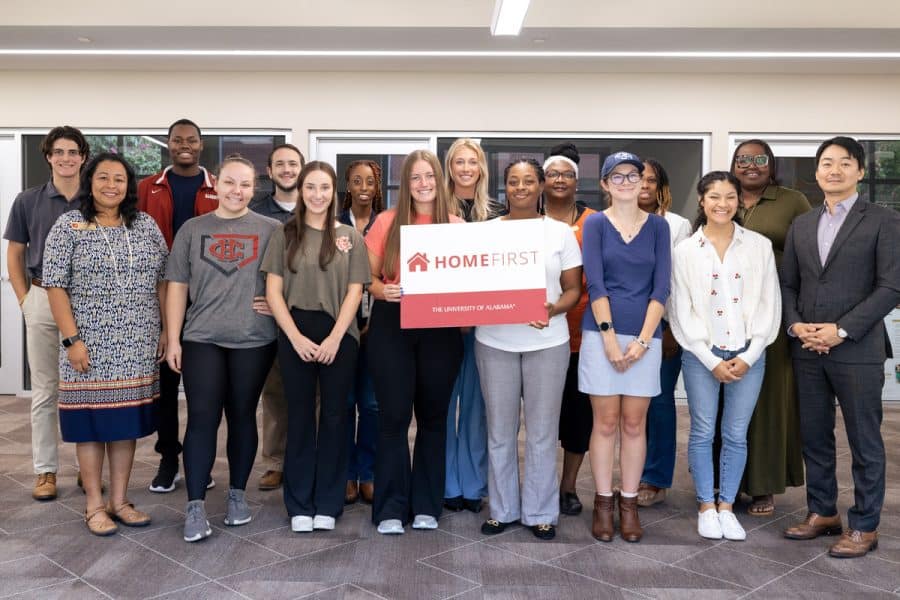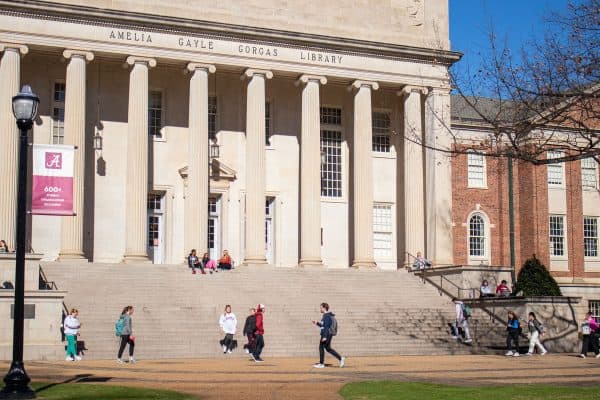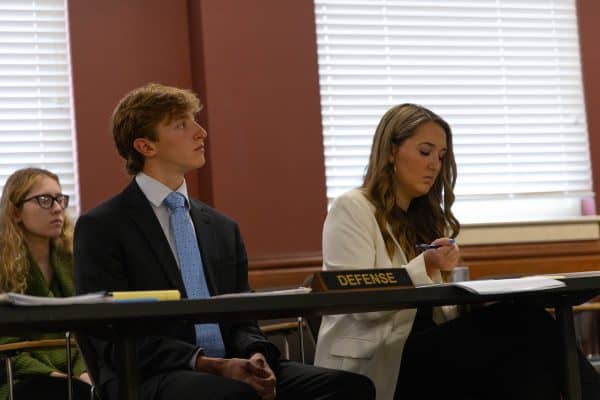HomeFirst aims to bring financial literacy to the local community
Group of volunteers during HomeFirst Coaches’ Retreat.
March 1, 2023
Hidden on the northeast side of campus, tucked away in Capital Hall, students can find the Division of Community Affairs’ Center for Community-Based Partnerships. According to the motto on their website, this lesser-known University initiative is committed to “Engaging Communities and Changing Lives.”
The CCBP outlines work in four main areas: Community Education, Program and Partnerships for Community Engagement, Global and Community Engagement, and Community Engagement Research and Publications.
Inside of the Program and Partnerships for Community Engagement office sits the HomeFirst program, which provides financial coaching to people who live in Alabama’s Greene, Hale and Tuscaloosa counties. HomeFirst is partnered with local housing authorities, including Habitat for Humanity, the City of Tuscaloosa and United Way of West Alabama, among others.
“The ultimate purpose of the HomeFirst program is to expand the pool of eligible homeowners by improving financial capability,” said Nicole Prewitt, the director of programs and partnerships for Community Based Engagement. “Our student-led, relationship-based approach supports community participants on their path toward homeownership. Our students are great assets as coaches, and the program benefits them with practical experience and the opportunity to learn alongside community participants.”
According to the Barriers to Prosperity report card by Birmingham-based non-profit Alabama Possible, Alabama is the sixth poorest state in the United States, with over 700,000 people under the poverty line, including over 200,000 children. .
James Renshaw, the program coordinator for programs and partnerships for Community Engagement, said that although HomeFirst is designed to pave a way towards homeownership, education itself is most important.
“We are a financial wellness initiative serving our area while we work towards first time homeownership or foreclosure prevention, so that financial wellness is the key there,” Renshaw said. “It’s great if someone comes through HomeFirst and they buy a home in the future, but we really care about that they’re learning these important financial life skills.”
Among these skills are modules on maintaining and building credit, savings, debt reduction foreclosure prevention and more. Along with the lessons, HomeFirst is also available to help guide its students towards legal help if needed, provide support for incorrect credit reports and more.
Ayana Hendricks, a graduate research assistant at the Center for Community-Based Partnerships and social work graduate student, said that while other topics are reviewed, credit is what interests most people.
“A lot of people are kind of geared towards credit, that’s one of the biggest things. Telling them the different cards that they can use to raise their credit score, they’re not familiar with that, and when it comes to getting things off of the credit reports, they’re not familiar with how you can do that,” Hendricks said. “The different websites advertise to do this if you pay this much, and we have access to different templates that they can send through the mail if they want to contact the credit bureau, and we also give them the websites as well just to dispute whatever information that they have on there.”
Greene County is one of the most impoverished in the state with a 27.9% poverty rate.
Renshaw, a UA alumnus, joined HomeFirst in 2021 because he believed it was not only important, but also a skill that was undertaught.
“My undergraduate was in economics, and I did my masters in financial planning and I thought wow, this is really important. Where are we learning this if you’re not taking classes in it?” Renshaw said.
However, he said not only is the community being educated, but also the coaches.
“Everyone is receiving free education, and it is stuff that really matters and is impactful to everyone for your entire life,” Renshaw said.
This education received by the coaches can be deeper than just finance, as Hendricks joined HomeFirst in the spring of 2022 to get further experience in the field of social work.
As with Hendricks, most of the coaches with HomeFirst are students.
“A majority are students; we also have some community members. Right now, we have 13 financial coaches; three are community members, one works at [The University of Alabama at Birmingham], one is retired living in Birmingham and one more works at Shelton State [Community College]. The 10 others are a mix of undergraduate, graduate and professional school students who work one on one with community members working on these financial education skills,” Renshaw said.
Getting students to volunteer can be difficult, but HomeFirst does not only benefit the community, but the volunteers as well.
“I go to classes over in Culverhouse for the wealth management minors, and then also consumer sciences for their financial planning courses, and just tell them ‘Hey, you can volunteer with HomeFirst, you get these soft skills to learn how to talk to people about money,” Renshaw said. “Also, one thing that they care about is hours with us count towards certain certifications.”
In August 2022, Habitat for Humanity Tuscaloosa dedicated a house to HomeFirst graduate Kanika Cotton. The house was funded by Coach Nick and Terry Saban’s charity, the Nick’s Kids Foundation.
“What I like about HomeFirst is that it actually helped me budget better, and it helped me save, too,” Cotton said in a release on the CCBP’s website. “[HomeFirst] got me prepared for being a homeowner and knowing what to expect.”
In order to answer questions and gauge interest, HomeFirst is holding an open Zoom information session on April 4 and 5 at 5 p.m. Registration beforehand is required.
HomeFirst also holds open to the public Zoom seminars headed by professionals. Topics in the past have included “Credit 101” and “Tax 101.”











